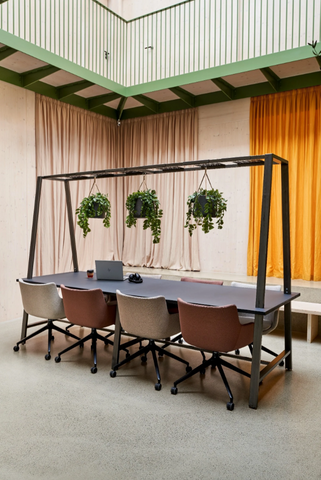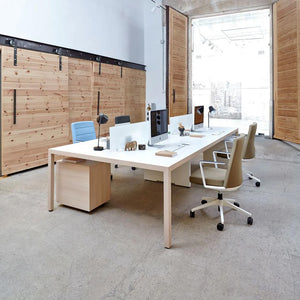
The Benefits of Workplace Benching and Bench Office Desks for Modern Workplaces
In the fast-paced and ever-evolving world of office design, it's important to stay ahead of the curve when it comes to creating a productive and efficient workspace. One popular trend that has gained traction in recent years is workplace benching, which involves the use of bench office desks. But what exactly is a bench desk?
Bench desks are essentially long, shared workstations that accommodate multiple employees. They typically consist of a single surface with multiple workstations or desk spaces, allowing colleagues to work side by side in a collaborative environment. These office desks are often modular and can be easily reconfigured to adapt to changing needs, making them a versatile option for modern workplaces.

Differences Between Bench Desks and Conventional Standalone Desks
While traditional standalone office desks have been a staple in workplace layouts for decades, bench desks offer several key differences that make them a compelling alternative for UK-based businesses.
-
Space Efficiency: One of the significant advantages of bench desks is their ability to maximize space utilization. By eliminating the need for individual desks for each employee, benching allows for a more efficient use of office real estate. This is particularly beneficial in UK cities where office space comes at a premium.
-
Collaboration and Communication: Bench desks foster a culture of collaboration and communication. By seating employees in close proximity, they encourage interaction and the sharing of ideas. This setup can improve teamwork, streamline decision-making processes, and enhance overall productivity.
-
Flexibility and Adaptability: Bench desks are highly flexible and adaptable to changing needs. As businesses grow and teams evolve, it's easy to reconfigure benching arrangements to accommodate new employees or create different workgroup configurations. This scalability makes bench desks a cost-effective solution in the long run.
Pros and Cons of Bench Desks and Standalone Desks
Like any office furniture option, bench desks and standalone office desks each have their own pros and cons. Let's explore these factors to help you make an informed decision for your workplace.
Pros of Bench Desks:
-
Cost-effective: Bench desks offer a cost-effective solution for businesses aiming to optimize their office space without compromising on quality or functionality. By reducing the number of individual desks needed, companies can save money on furniture expenses.
-
Collaboration and Teamwork: With employees seated closer together, benching encourages collaboration and teamwork. The open layout promotes easy communication, fosters a sense of community, and can lead to increased employee engagement and satisfaction.
-
Flexibility and Future-proofing: Bench desks are highly adaptable, allowing for easy reconfiguration as your office needs change over time. Whether you need to accommodate new hires or create different teams, benching can be easily adjusted to suit your evolving requirements.
Cons of Bench Desks:
-
Noise and Distractions: The open layout of bench desks can lead to increased noise levels and potential distractions. Some individuals may prefer a quieter, more private workspace, which could be a challenge in a benching setup.
-
Limited Personalization: With bench desks, personalization options for individual workstations may be limited. Employees may have less control over their immediate workspace and may need to adjust to a more standardized setup.
-
Need for Proper Management: Bench desks require thoughtful management to ensure a fair and equitable distribution of resources and consideration of individual work styles. It's essential to establish guidelines and policies to address potential challenges and conflicts.
Making the Right Choice for Your Workplace
When considering office layouts and suitable furniture options for your workplace, it's crucial to evaluate the benefits and drawbacks of various alternatives. Office benching & bench desks offers numerous advantages, such as space efficiency and promoting collaboration, but it's important to address the potential drawbacks as well.

To make the right choice, consider the following factors:
-
Office Culture and Work Style: Assess your company's culture and the nature of your work. If your employees thrive in a collaborative environment that encourages frequent interaction and teamwork, bench desks may be a great fit. However, if individual focus and privacy are critical for your team's productivity, standalone desks might be a better option.
-
Space Constraints: Evaluate the available office space and the number of employees you need to accommodate. Bench desks can make efficient use of limited space by optimizing the workstation density. If space is at a premium, benching can help you maximize your square footage and potentially reduce your real estate costs.
-
Flexibility and Scalability: Consider the future growth and changes your business may undergo. Bench desks offer scalability and adaptability, allowing you to easily reconfigure the layout as your team expands or organizational needs shift. This flexibility can save you time and money in the long run.
-
Noise Management and Privacy: Determine how important noise control and privacy are for your employees. Open benching layouts may result in increased noise levels and potential distractions. If concentration and privacy are crucial for certain tasks, consider incorporating designated quiet areas or providing noise-cancelling options within the benching setup.
-
Employee Preferences: Gather feedback from your employees and involve them in the decision-making process. Understanding their preferences and work styles can help you strike a balance between collaboration and individual needs. Consider offering some degree of personalization within the benching setup to accommodate individual preferences.
In conclusion, workplace benching and bench desks can be a viable choice for businesses seeking a modern and collaborative workspace. They offer space efficiency, promote collaboration and communication, and provide flexibility for future growth. However, it's important to address potential drawbacks such as noise and distractions and limited personalization. By carefully considering your office culture, space constraints, flexibility needs, and employee preferences, you can make an informed decision that aligns with your business objectives and enhances productivity in your workplace.


